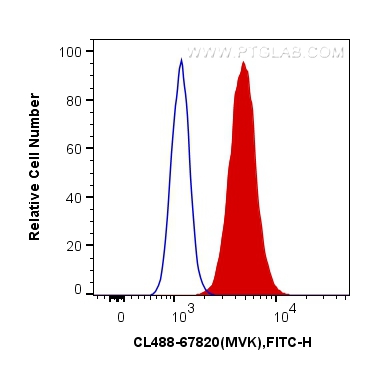验证数据展示
经过测试的应用
| Positive FC (Intra) detected in | HepG2 cells |
推荐稀释比
| 应用 | 推荐稀释比 |
|---|---|
| Flow Cytometry (FC) (INTRA) | FC (INTRA) : 0.40 ug per 10^6 cells in a 100 µl suspension |
| It is recommended that this reagent should be titrated in each testing system to obtain optimal results. | |
| Sample-dependent, Check data in validation data gallery. | |
产品信息
CL488-67820 targets MVK in FC (Intra) applications and shows reactivity with human samples.
| 经测试应用 | FC (Intra) Application Description |
| 经测试反应性 | human |
| 免疫原 | MVK fusion protein Ag28887 种属同源性预测 |
| 宿主/亚型 | Mouse / IgG2b |
| 抗体类别 | Monoclonal |
| 产品类型 | Antibody |
| 全称 | mevalonate kinase |
| 别名 | MVLK, MK, Mevalonate kinase, LRBP, EC:2.7.1.36 |
| 计算分子量 | 396 aa, 42 kDa |
| 观测分子量 | 42 kDa |
| GenBank蛋白编号 | BC016140 |
| 基因名称 | MVK |
| Gene ID (NCBI) | 4598 |
| RRID | AB_2923795 |
| 偶联类型 | CoraLite® Plus 488 Fluorescent Dye |
| 最大激发/发射波长 | 493 nm / 522 nm |
| 形式 | Liquid |
| 纯化方式 | Protein A purification |
| UNIPROT ID | Q03426 |
| 储存缓冲液 | PBS with 50% glycerol, 0.05% Proclin300, 0.5% BSA , pH 7.3 |
| 储存条件 | Store at -20°C. Avoid exposure to light. Stable for one year after shipment. Aliquoting is unnecessary for -20oC storage. |
背景介绍
MVK (Mevalonate kinase) is a 42 kDa cytoplasmic protein that belongs to the GHMP kinase family. Mevalonate kinase catalyzes the ATP-dependent phosphorylation of mevalonic acid to form mevalonate 5-phosphate. Defects in mevalonate kinase can cause mevalonic aciduria (MEVA). It is an accumulation of mevalonic acid which causes a variety of symptoms such as psychomotor retardation, dysmorphic features, cataracts, hepatosplenomegaly, lymphadenopathy, anemia, hypotonia, myopathy and ataxia.
实验方案
| Product Specific Protocols | |
|---|---|
| FC protocol for CL Plus 488 MVK antibody CL488-67820 | Download protocol |
| Standard Protocols | |
|---|---|
| Click here to view our Standard Protocols |
